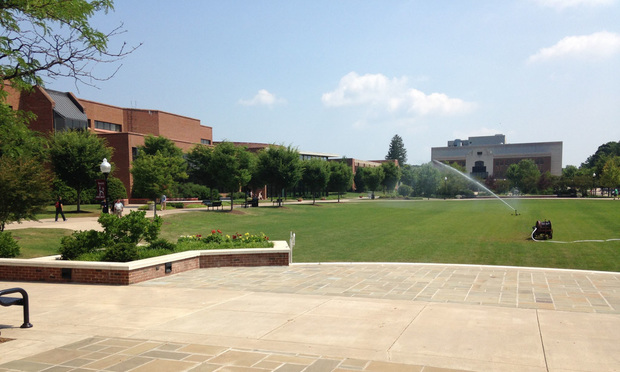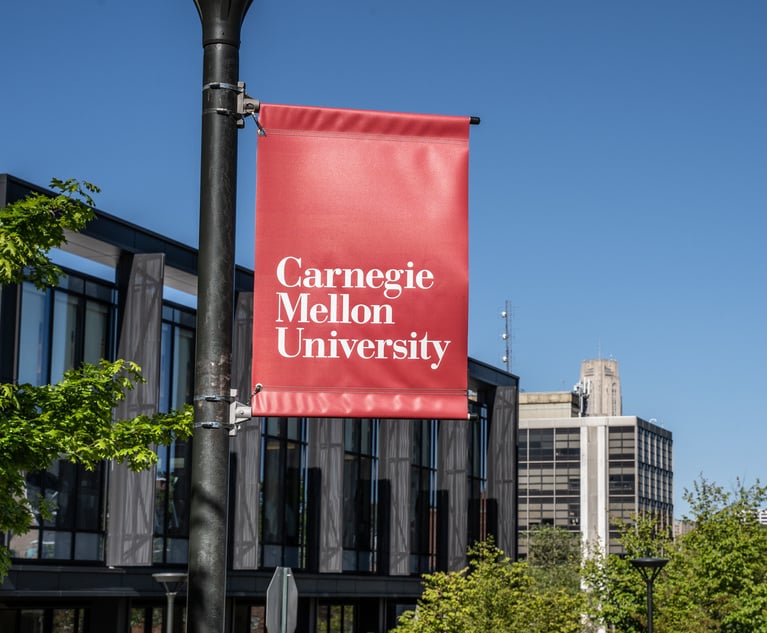Court OKs Reinstatement of Bloomsburg Professor Fired for Sex With Students
The Commonwealth Court has upheld an arbitrator's decision to reinstate Bloomsburg University assistant professor John Barrett, who was fired for having sexual relationships with two of his former students.
May 22, 2019 at 04:09 PM
4 minute read
 Bloomsburg University Academic Quad. Photo: Wikimedia Commons
Bloomsburg University Academic Quad. Photo: Wikimedia Commons
The Commonwealth Court has upheld an arbitrator's decision to reinstate Bloomsburg University assistant professor John Barrett, who was fired for having sexual relationships with two of his former students.
In a May 16 nonprecedential opinion in Pennsylvania State System of Higher Education, Bloomsburg University of Pennsylvania v. Association of Pennsylvania State College and University Faculties, a three-judge panel of the appellate court affirmed the arbitrator's finding that Barrett's conduct did not violate the university's policies against sexual harassment and discrimination.
According to the opinion, one of the two women with whom Barrett had sexual relationships, referred to as “complainant,” notified Bloomsburg officials of both relationships. The university's president, Dr. David Soltz, then notified Barrett of his termination by letter, citing a lack of professional judgment related to both relationships and “'engaging in sexual conduct [with complainant] without [complainant's] consent,'” the opinion said.
The Association of Pennsylvania State College and University Faculties filed a grievance on Barrett's behalf.
Complainant, who began her sexual relationship with Barrett the semester after she completed his course, alleged there were several occasions on which she awoke to find Barrett touching her genitals, which made her uncomfortable, according to the opinion. Barrett, however, denied this ever occurred.
An arbitrator ultimately found that, even if those acts did take place, they occurred within the context of a consensual sexual relationship and did not constitute sexual harassment in violation of Bloomsburg's policies.
On appeal, the university argued that the arbitrator's award required it to reinstate a criminal, but the Commonwealth Court panel, led by Judge P. Kevin Brobson, rejected that contention.
“The obvious problem with the university's contention here is that there is no record that grievant was ever charged with, prosecuted for, or convicted of indecent sexual assault stemming from the alleged acts,” said Brobson, joined by Judges Renee Cohn Jubelirer and Ellen Ceisler. ”Rather, we are only dealing with an arbitrator's finding that if the alleged acts occurred, they occurred within the context of a consensual sexual relationship, which is permitted by the university's policies.”
With that in mind, Brobson said there was no applicable public policy exception that could invalidate the arbitration award.
“Here, the arbitrator considered the university's policy against sexual harassment and discrimination, specifically as it pertains to unconsented physical sexual acts and consensual interpersonal relationships,” Brobson said. “The arbitrator expressly found that grievant and complainant engaged in a consensual sexual relationship and that grievant's conduct did not violate any of the university's policies against sexual harassment and discrimination. Thus, grievant's conduct, as characterized by the arbitrator, does not implicate the public policy against sexual harassment. As a result, the arbitration award does not pose an unacceptable risk of undermining the public policy and does not prevent the university from upholding its obligation to protect the public.”
But Brobson did note that the panel's decision should not be interpreted as disregard for Barrett's “appalling lack of judgment, especially as one who once held a position of trust for complainant.”
Similarly, the arbitrator stressed that her opinion reinstating Barrett should not be construed as condoning his conduct.
“The inherent exploitative nature of relationships with students … calls for greater insight and more restraint,” the arbitrator said. “That he avoided termination here does not mean that he was prudent, kind or wise.”
Counsel for PSSHE, Paul Lalley of Campbell Durrant Beatty Palombo & Miller in Pittsburgh, did not return a call for comment. Counsel for the union, James Cowden of Strokoff & Cowden in Harrisburg, also did not return a call for comment.
(Copies of the 12-page opinion in Pennsylvania State System of Higher Education v. Association of Pennsylvania State College and University Faculties, PICS No. 19-0639, are available at http://at.law.com/PICS.)
This content has been archived. It is available through our partners, LexisNexis® and Bloomberg Law.
To view this content, please continue to their sites.
Not a Lexis Subscriber?
Subscribe Now
Not a Bloomberg Law Subscriber?
Subscribe Now
NOT FOR REPRINT
© 2025 ALM Global, LLC, All Rights Reserved. Request academic re-use from www.copyright.com. All other uses, submit a request to [email protected]. For more information visit Asset & Logo Licensing.
You Might Like
View All
Sanctioned Penn Law Professor Amy Wax Sues University, Alleging Discrimination
5 minute read
Pa. Superior Court: Sorority's Interview Notes Not Shielded From Discovery in Lawsuit Over Student's Death
3 minute read
LSAT Administrator Sues to Block AI Tutor From Using ‘Famous, Distinctive’ Test Prep Materials
3 minute read
Disjunctive 'Severe or Pervasive' Standard Applies to Discrimination Claims Against University, Judge Rules
5 minute readTrending Stories
Who Got The Work
J. Brugh Lower of Gibbons has entered an appearance for industrial equipment supplier Devco Corporation in a pending trademark infringement lawsuit. The suit, accusing the defendant of selling knock-off Graco products, was filed Dec. 18 in New Jersey District Court by Rivkin Radler on behalf of Graco Inc. and Graco Minnesota. The case, assigned to U.S. District Judge Zahid N. Quraishi, is 3:24-cv-11294, Graco Inc. et al v. Devco Corporation.
Who Got The Work
Rebecca Maller-Stein and Kent A. Yalowitz of Arnold & Porter Kaye Scholer have entered their appearances for Hanaco Venture Capital and its executives, Lior Prosor and David Frankel, in a pending securities lawsuit. The action, filed on Dec. 24 in New York Southern District Court by Zell, Aron & Co. on behalf of Goldeneye Advisors, accuses the defendants of negligently and fraudulently managing the plaintiff's $1 million investment. The case, assigned to U.S. District Judge Vernon S. Broderick, is 1:24-cv-09918, Goldeneye Advisors, LLC v. Hanaco Venture Capital, Ltd. et al.
Who Got The Work
Attorneys from A&O Shearman has stepped in as defense counsel for Toronto-Dominion Bank and other defendants in a pending securities class action. The suit, filed Dec. 11 in New York Southern District Court by Bleichmar Fonti & Auld, accuses the defendants of concealing the bank's 'pervasive' deficiencies in regards to its compliance with the Bank Secrecy Act and the quality of its anti-money laundering controls. The case, assigned to U.S. District Judge Arun Subramanian, is 1:24-cv-09445, Gonzalez v. The Toronto-Dominion Bank et al.
Who Got The Work
Crown Castle International, a Pennsylvania company providing shared communications infrastructure, has turned to Luke D. Wolf of Gordon Rees Scully Mansukhani to fend off a pending breach-of-contract lawsuit. The court action, filed Nov. 25 in Michigan Eastern District Court by Hooper Hathaway PC on behalf of The Town Residences LLC, accuses Crown Castle of failing to transfer approximately $30,000 in utility payments from T-Mobile in breach of a roof-top lease and assignment agreement. The case, assigned to U.S. District Judge Susan K. Declercq, is 2:24-cv-13131, The Town Residences LLC v. T-Mobile US, Inc. et al.
Who Got The Work
Wilfred P. Coronato and Daniel M. Schwartz of McCarter & English have stepped in as defense counsel to Electrolux Home Products Inc. in a pending product liability lawsuit. The court action, filed Nov. 26 in New York Eastern District Court by Poulos Lopiccolo PC and Nagel Rice LLP on behalf of David Stern, alleges that the defendant's refrigerators’ drawers and shelving repeatedly break and fall apart within months after purchase. The case, assigned to U.S. District Judge Joan M. Azrack, is 2:24-cv-08204, Stern v. Electrolux Home Products, Inc.
Featured Firms
Law Offices of Gary Martin Hays & Associates, P.C.
(470) 294-1674
Law Offices of Mark E. Salomone
(857) 444-6468
Smith & Hassler
(713) 739-1250





